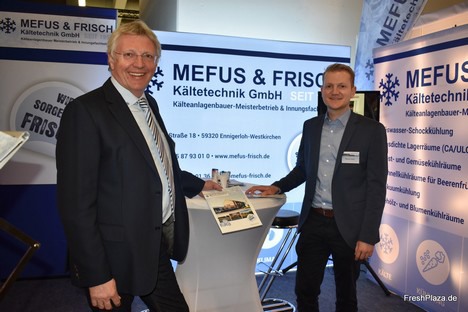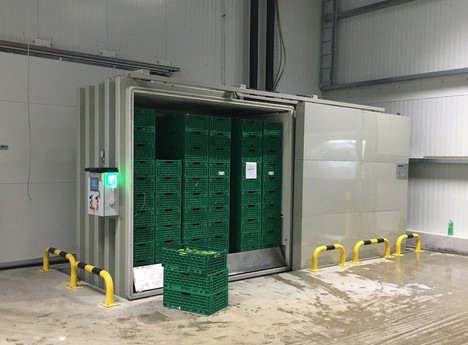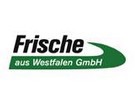Vacuum-cooling has become standard practice in the vegetable sector. The German family business, Mefus & Frisch, advises on and supplies these systems. They've been doing so for German clients for almost ten years. They work closely with their supplier, Weber Cooling. However, according to Gerhard and Thomas Frisch, the range of products that can be cooled using this technique hasn't yet been fully exploited.
Mefus & Frisch is active in the field of refrigeration installations on the German market. Even before teaming up with Weber Cooling. "Right from the start, we complemented each other perfectly. Weber used to mainly supply vacuum pre-coolers. However, large industrial companies benefit more from exclusive, tailor-made solutions. Together with Weber, we're able to respond flexibly to this type of request. We've now fully mastered this market segment in just a few years," says Gerhard Frisch, Mefus & Frisch's senior managing director.

Gerhard Frisch and his son, Thomas, at Fruit Logistica 2020.
Mefus & Frisch now supplies about ten vacuum refrigeration systems annually. These installations' vacuum and cooling performance has improved considerably over the years, Gerhard points out. "There are many coolants available today. Subsidized plants use only natural refrigerants such as propane and CO2. Smaller operations, on the other hand, rely on synthetic alternatives."
Vacuum vs. air cooling
According to Frisch, the vacuum method is increasingly gaining preference over air cooling. "First of all, products lose less moisture. That's advantageous for the user since it means higher product quality and weight. Unlike air cooling, vacuum systems cool from the inside out. That protects the product's surface, resulting in significantly longer shelf life."
The range of products that can be cooled using this method has also grown considerably. "We started with lettuce and vegetables only. Nowadays, we can use vacuum technology to also refrigerate sods, herbs, and, more recently, mushrooms. But, we've found that this method can't be used for all products, like strawberries and asparagus. We work closely with Weber Cooling. And we're now investigating possible further applications, including outside the fruit and vegetable sector."
Centralized systems
Centralized systems - multiple refrigeration compressors linked by a central installation - are becoming increasingly common too. "This system's main advantage is being able to adapt the cooling performance to the system's requirements. After all, these installations can easily adjust to the goods' total weight. That ultimately improves the cooled products' temperature and quality," says Frisch. Also, unlike single installations, you can cool several products simultaneously, each under the appropriate conditions.

A vacuum-cooling system in Frische aus Westfalen GmbH's new production warehouse. The Weber application provides improved cooling. Thanks to that, lettuce can now be cooled within 15-20 minutes and mushrooms in 10-15. It can cool sods down within 30 minutes. Photo credit: Mefus & Frisch
Long-term partnership
The Dörmann family from the German vegetable company, Frische aus Westfalen's, has been a client from the very start. "We've been using Mefus & Frisch refrigeration technology for decades. We now have two vacuum coolers," says the current manager, Sebastian Dörmann. "We're delighted with their service. And after so many years, we know what we can offer each other."
These vacuum-cooling systems considerably simplify this cultivation company's process. "With conventional refrigeration technology, it sometimes takes days - depending on the outside temperature - for products to reach commercially-required temperatures. Thanks to the vacuum cooler, this process only takes 20 to 30 minutes. That means if we receive an order in the morning, we can harvest the vegetables in the afternoon. We can then cool them and deliver them that same night. So, the products on the market are much fresher, only a day old," says Sebastian.
There are now two vacuum coolers at the Dörmann farm. Photo credit: Mefus & Frisch
Sebastian says the products also store better. "The sooner products' inside temperatures drop, the longer their shelf life at the client. They don't have to be stored for as long in our regular refrigerators either. There is another long-term advantage - our cold stores have less wear and tear. After all, products no longer need to be actively cooled, just kept at the correct temperature," he concludes.
For more information:
Weber Cooling
Sylvia van Uden and Hans Juursema
Tel +31 (0) 884 256 207 / +31 (0) 644 738 519
Email: svu@webercooling.com / hj@webercooling.com
Website: www.webercooling.com
MEFUS & FRISCH
Gerhard & Thomas Frisch 
Kältetechnik GmbH
18 Warendorfer Street
59320 Ennigerloh-Westkirchen, Germany
Tel: +49 (0) 258 793 010
Email: info@mefus-frisch.de
Website: www.mefus-frisch.de
Frische aus Westfalen GmbH
Sebastian Dörmann
104 Blackenfeld
33739, Bielefeld, Germany
Tel. +49 (0) 521 39 948 50
Email: s.doermann@frischeauswestfalen.de
Website: http://www.frischeauswestfalen.de/
